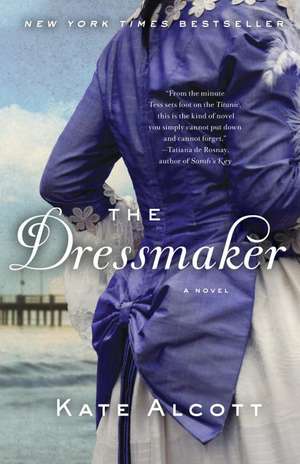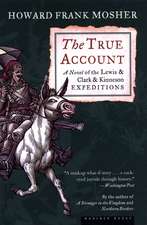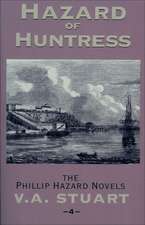The Dressmaker
Autor Kate Alcotten Limba Engleză Paperback – 31 dec 2012
The survivors are rescued and taken to New York, but when rumors begin to circulate about the choices they made, Tess is forced to confront a serious question. Did Lady Duff Gordon save herself at the expense of others? Torn between loyalty to Lucile and her growing suspicion that the media’s charges might be true, Tess must decide whether to stay quiet and keep her fiery mentor’s good will or face what might be true and forever change her future.
Preț: 93.35 lei
Nou
Puncte Express: 140
Preț estimativ în valută:
17.88€ • 18.42$ • 15.00£
17.88€ • 18.42$ • 15.00£
Carte indisponibilă temporar
Doresc să fiu notificat când acest titlu va fi disponibil:
Se trimite...
Preluare comenzi: 021 569.72.76
Specificații
ISBN-13: 9780307948199
ISBN-10: 0307948196
Pagini: 384
Dimensiuni: 130 x 203 x 23 mm
Greutate: 0.3 kg
Editura: Anchor Books
ISBN-10: 0307948196
Pagini: 384
Dimensiuni: 130 x 203 x 23 mm
Greutate: 0.3 kg
Editura: Anchor Books
Notă biografică
KATE ALCOTT was a reporter covering politics in Washington D.C., where she and her husband still live
Extras
1
cherbourg, france april 10, 1912
Tess pulled at the corners of the sheets she had taken straight from the line and tried to tuck them tight under the mattress, stepping back to check her work. Still a bit bunchy and wrinkled. The overseer who ran this house was sure to inspect and sniff and scold, but it didn’t matter anymore.
She glanced out the window. A woman was walking by, wearing a splendid hat topped with a rich, deep-green ribbon, twirling a bright-red parasol, her face lively, her demeanor confident and sunny. Tess tried to imagine herself stepping forward so confidently without someone accusing her of behaving above her station. She could almost feel her fingers curling around the smooth, polished handle of that parasol. Where was the woman going?
She gazed back at the half-made bed. No more fantasizing, not one more minute of it.
She walked out into the central hall and stopped, held in place by the sight of her reflection in the full-length gilded mirror at the end of the hall. Her long dark hair, as always, had pulled out of a carelessly pinned bun, even as the upward tilt of her chin, which had so often registered boldness, remained in place. But there was no denying the shameful crux of what she saw: a skinny young girl wearing a black dress and a white apron and carrying a pile of dirty linens, with a servant’s cap sitting squarely and stupidly on the top of her head. An image of servitude. She yanked the cap off her head and hurled it at the glass. She was not a servant. She was a seamstress, a good one, and she should be paid for her work. She had been tricked into this job.
Tess dumped the soiled linens down the laundry chute and climbed the stairs to her third-floor room, untying her apron as she went. Today, yes. No further hesitation. There were jobs available, the dockworkers had said, on that huge ship sailing for New York today. She scanned the small room. No valise—the mistress would stop her cold at the door if she knew she was leaving. The picture of her mother, yes. The money. Her sketchbook, with all her designs. She took off her uniform, put on her best dress, and stuffed some undergarments, stockings, and her only other dress into a canvas sack. She stared at the half-finished ball gown draped over the sewing machine, at the tiny bows of crushed white velvet she had so painstakingly stitched onto the ballooning blue silk. Someone else would have to finish it, someone who actually got paid. What else? Nothing.
She took a deep breath, trying to resist the echo of her father’s voice in her head: Don’t put on airs, he always scolded. You’re a farm girl, do your job, keep your head down. You get decent enough pay; mind you don’t wreck your life with defiance.
“I won’t wreck it,” she whispered out loud. “I’ll make it better.”
But, even as she turned and left her room for the last time, she could almost hear his voice following her, as raspy and angry as ever: “Watch out, foolish girl.”
The rotting wood planks beneath Lucile’s feet were spongy, catching her boot heels as she made her way through the crowd on the Cherbourg dock. She pulled her silver-fox stole snugly around her neck, luxuriating in the plush softness of the thick fur, and lifted her head high, attracting many glances, some triggered by the sight of her brilliantly red hair, others by the knowledge of who she was.
She glanced at her sister walking quickly toward her, humming some new song, twirling a red parasol as she walked. “You do enjoy playing the blithe spirit, don’t you?” she said.
“I try to be an agreeable person,” her sister murmured.
“I have no need to compete; you may have the attention,” Lucile said in her huskiest, haughtiest voice.
“Oh, stop it, Lucy. Neither of us is impoverished on that score. Really, you are cranky lately.”
“If you were presenting a spring collection in New York in a few weeks, you’d be cranky, too. I have too much to worry about with all this talk of women hiking their skirts and flattening their breasts. All you have to do is write another novel about them.”
The two of them started squeezing past the dozens of valises and trunks, brass hinges glowing in the waning light, their skirts of fine wool picking up layers of damp dust turned to grime.
“It’s true, the tools of my trade are much more portable than yours,” Elinor said airily.
“They certainly are. I’m forced to make this crossing because I don’t have anyone competent enough to be in charge of the show, so I must be there. So please don’t be frivolous.”
Elinor closed her parasol with a snap and stared at her sister, one perfect eyebrow arched. “Lucy, how can you have no sense of humor? I’m only here to wish you bon voyage and cheer you on when the ship departs. Shall I leave now?”
Lucile sighed and took a deep breath, allowing a timed pause. “No, please,” she said. “I only wish you were sailing with me. I will miss you.”
“I would like nothing better than to go with you, but my editor wants those corrected galleys back by the end of the week.” Elinor’s voice turned sunny again. “Anyway, you have Cosmo—such a sweetheart, even if he doesn’t appreciate poetry.”
“A small defect.”
“He’s a dear, and his best gift to you has been a title. Is that too crass? But it is true that he has no literary appreciation.” Elinor sighed. “And he can be boring.”
“Nonsense.”
“You know it as well as I do. Where is he?”
Lucile was scanning the crowd, searching for the tall, angular figure of Sir Cosmo Duff Gordon. “This delay is maddening. If anybody can get things operating efficiently and on time, Cosmo can.”
“Of course. That’s his job.”
Lucile glanced sharply at Elinor, but she was looking elsewhere, an innocent expression on her face.
Up the hill, away from the shipyard, amid the sprawling brick mansions on the bluffs of the Normandy coast, Tess was marching downstairs to the parlor. Waiting for her was the mistress, a prim Englishwoman with lips so thin they seemed stitched together.
“I want my pay, please,” Tess said, hiding the canvas sack in the folds of her skirt. She could see the envelope waiting for her on the corner table by the door, and began edging toward it.
“You haven’t finished my gown for the party, Tess,” the woman said in a more querulous tone than usual. “And my son could hardly find a towel in the hall closet this morning.”
“He’ll find one now.” She was not going back upstairs. She would never again be backed into that linen closet, fighting off the adolescent son’s eager, spidery fingers. That was her envelope; she could see her name written on it, and she wasn’t standing around to hear the usual complaints before it was doled out. She moved closer to the table.
“You’ve said that before, and I’m going upstairs right now to check.” The woman stopped as she saw the girl reaching out for the envelope. “Tess, I haven’t given that to you yet!”
“Perhaps not, but I have earned it,” Tess said carefully.
“Rudeness is not admirable, Tess. You’ve been very secretive lately. If you pick that up before I give it to you, you have burned your bridges with me.”
Tess took a deep breath and, feeling slightly dizzy, picked up the envelope and held it close, as if it might be snatched away.
“Then I have,” she said. Without waiting for a reply, she opened the heavily ornate front door she would never have to polish again and headed for the docks. After all her dreaming and brooding, the time was now.
The dock was slippery with seaweed. Heart pounding, she pressed into the bustle and chaos around her and sucked into her lungs the sharp, salty air of the sea. But where were the signs advertising jobs? She accosted a man in a uniform with large brass buttons and asked in hesitant French and then urgent English who was in charge of hiring staff for cleaning and cooking on that big new ship.
“You’re too late, dear, the servicepeople have all been hired and the passengers will soon be boarding. Bad luck for you, I’m afraid.” He turned away.
It didn’t matter how brightly she smiled; her plan was falling apart. Idiot—she should have come down earlier. What now? She gulped back the hollow feeling of not knowing what came next and tried to think. Find families; look for young children. She would be a good nanny. Didn’t having seven younger brothers and sisters count as experience? She was ready to go, no trouble at all; all she had to do was find the right person and say the right things and she could get away. She would not, she would not be trapped; she would get out.
But no one paid her any heed. An elderly English couple shrank back when she asked if they needed a companion for the trip. When she approached a family with children, offering her services, they looked at her askance, politely shook their heads, and edged away. What could she expect? She must look desperate, tangled hair and all.
“Lucy, look at that girl over there.” Elinor pointed a delicate, polished finger at the frantic Tess. “My goodness, she’s a beauty. Gorgeous, big eyes. Look at her running around talking to people. I think she’s trying to get on the ship. Do you think she’s running away from something? Maybe the police? A man?”
“I wouldn’t know, but I’m sure you’ll weave a good story out of it,” Lucy said, waving to Cosmo’s approaching figure. He looked, as usual, somewhat detached from his surroundings. Cool eyes, a calm demeanor; always in charge. Following him, at his heels, was a timid-looking messenger.
“Lucile, there is a problem—” Cosmo began.
“I knew it,” Lucile said, her jaw tightening. “It’s Hetty, isn’t it?”
“She says she is unable to come. Her mother is ill,” the messenger said. He bent forward almost in nervous homage—as well he might, because Lucile was furious now.
“Tell that girl she can’t back out just before we sail. Who does she think she is? If she doesn’t board with us, she’s fired. Have you told her that?” She glared at the man.
“I have, Madame,” he ventured.
Tess heard the commotion and stopped, arrested by the sight of the two women. Could it be? Yes, one of them wore the same grand hat with the gorgeous green ribbon she had spied from the window; she was right here, idly tapping the ground with that same red parasol.
The other woman’s sharp voice jolted her attention away.
“A miserable excuse!” she snapped.
Someone hadn’t shown up for the trip, some kind of servant, and this small person with the bright-red hair and crimson lipstick was furious. How formidable she looked. Her strong-boned, immobile face admitted no compromise, and her wide-set eyes looked as if they could change from soft to hard in seconds. There was no softness in them now.
“Who is she?” Tess demanded of a young man attached to the clustered group. Her voice was trembling. Nothing was working out.
“You don’t know?”
She looked again at the woman, noting how people slowed as they passed, whispering, casting admiring glances. Yes, there was something familiar.
cherbourg, france april 10, 1912
Tess pulled at the corners of the sheets she had taken straight from the line and tried to tuck them tight under the mattress, stepping back to check her work. Still a bit bunchy and wrinkled. The overseer who ran this house was sure to inspect and sniff and scold, but it didn’t matter anymore.
She glanced out the window. A woman was walking by, wearing a splendid hat topped with a rich, deep-green ribbon, twirling a bright-red parasol, her face lively, her demeanor confident and sunny. Tess tried to imagine herself stepping forward so confidently without someone accusing her of behaving above her station. She could almost feel her fingers curling around the smooth, polished handle of that parasol. Where was the woman going?
She gazed back at the half-made bed. No more fantasizing, not one more minute of it.
She walked out into the central hall and stopped, held in place by the sight of her reflection in the full-length gilded mirror at the end of the hall. Her long dark hair, as always, had pulled out of a carelessly pinned bun, even as the upward tilt of her chin, which had so often registered boldness, remained in place. But there was no denying the shameful crux of what she saw: a skinny young girl wearing a black dress and a white apron and carrying a pile of dirty linens, with a servant’s cap sitting squarely and stupidly on the top of her head. An image of servitude. She yanked the cap off her head and hurled it at the glass. She was not a servant. She was a seamstress, a good one, and she should be paid for her work. She had been tricked into this job.
Tess dumped the soiled linens down the laundry chute and climbed the stairs to her third-floor room, untying her apron as she went. Today, yes. No further hesitation. There were jobs available, the dockworkers had said, on that huge ship sailing for New York today. She scanned the small room. No valise—the mistress would stop her cold at the door if she knew she was leaving. The picture of her mother, yes. The money. Her sketchbook, with all her designs. She took off her uniform, put on her best dress, and stuffed some undergarments, stockings, and her only other dress into a canvas sack. She stared at the half-finished ball gown draped over the sewing machine, at the tiny bows of crushed white velvet she had so painstakingly stitched onto the ballooning blue silk. Someone else would have to finish it, someone who actually got paid. What else? Nothing.
She took a deep breath, trying to resist the echo of her father’s voice in her head: Don’t put on airs, he always scolded. You’re a farm girl, do your job, keep your head down. You get decent enough pay; mind you don’t wreck your life with defiance.
“I won’t wreck it,” she whispered out loud. “I’ll make it better.”
But, even as she turned and left her room for the last time, she could almost hear his voice following her, as raspy and angry as ever: “Watch out, foolish girl.”
The rotting wood planks beneath Lucile’s feet were spongy, catching her boot heels as she made her way through the crowd on the Cherbourg dock. She pulled her silver-fox stole snugly around her neck, luxuriating in the plush softness of the thick fur, and lifted her head high, attracting many glances, some triggered by the sight of her brilliantly red hair, others by the knowledge of who she was.
She glanced at her sister walking quickly toward her, humming some new song, twirling a red parasol as she walked. “You do enjoy playing the blithe spirit, don’t you?” she said.
“I try to be an agreeable person,” her sister murmured.
“I have no need to compete; you may have the attention,” Lucile said in her huskiest, haughtiest voice.
“Oh, stop it, Lucy. Neither of us is impoverished on that score. Really, you are cranky lately.”
“If you were presenting a spring collection in New York in a few weeks, you’d be cranky, too. I have too much to worry about with all this talk of women hiking their skirts and flattening their breasts. All you have to do is write another novel about them.”
The two of them started squeezing past the dozens of valises and trunks, brass hinges glowing in the waning light, their skirts of fine wool picking up layers of damp dust turned to grime.
“It’s true, the tools of my trade are much more portable than yours,” Elinor said airily.
“They certainly are. I’m forced to make this crossing because I don’t have anyone competent enough to be in charge of the show, so I must be there. So please don’t be frivolous.”
Elinor closed her parasol with a snap and stared at her sister, one perfect eyebrow arched. “Lucy, how can you have no sense of humor? I’m only here to wish you bon voyage and cheer you on when the ship departs. Shall I leave now?”
Lucile sighed and took a deep breath, allowing a timed pause. “No, please,” she said. “I only wish you were sailing with me. I will miss you.”
“I would like nothing better than to go with you, but my editor wants those corrected galleys back by the end of the week.” Elinor’s voice turned sunny again. “Anyway, you have Cosmo—such a sweetheart, even if he doesn’t appreciate poetry.”
“A small defect.”
“He’s a dear, and his best gift to you has been a title. Is that too crass? But it is true that he has no literary appreciation.” Elinor sighed. “And he can be boring.”
“Nonsense.”
“You know it as well as I do. Where is he?”
Lucile was scanning the crowd, searching for the tall, angular figure of Sir Cosmo Duff Gordon. “This delay is maddening. If anybody can get things operating efficiently and on time, Cosmo can.”
“Of course. That’s his job.”
Lucile glanced sharply at Elinor, but she was looking elsewhere, an innocent expression on her face.
Up the hill, away from the shipyard, amid the sprawling brick mansions on the bluffs of the Normandy coast, Tess was marching downstairs to the parlor. Waiting for her was the mistress, a prim Englishwoman with lips so thin they seemed stitched together.
“I want my pay, please,” Tess said, hiding the canvas sack in the folds of her skirt. She could see the envelope waiting for her on the corner table by the door, and began edging toward it.
“You haven’t finished my gown for the party, Tess,” the woman said in a more querulous tone than usual. “And my son could hardly find a towel in the hall closet this morning.”
“He’ll find one now.” She was not going back upstairs. She would never again be backed into that linen closet, fighting off the adolescent son’s eager, spidery fingers. That was her envelope; she could see her name written on it, and she wasn’t standing around to hear the usual complaints before it was doled out. She moved closer to the table.
“You’ve said that before, and I’m going upstairs right now to check.” The woman stopped as she saw the girl reaching out for the envelope. “Tess, I haven’t given that to you yet!”
“Perhaps not, but I have earned it,” Tess said carefully.
“Rudeness is not admirable, Tess. You’ve been very secretive lately. If you pick that up before I give it to you, you have burned your bridges with me.”
Tess took a deep breath and, feeling slightly dizzy, picked up the envelope and held it close, as if it might be snatched away.
“Then I have,” she said. Without waiting for a reply, she opened the heavily ornate front door she would never have to polish again and headed for the docks. After all her dreaming and brooding, the time was now.
The dock was slippery with seaweed. Heart pounding, she pressed into the bustle and chaos around her and sucked into her lungs the sharp, salty air of the sea. But where were the signs advertising jobs? She accosted a man in a uniform with large brass buttons and asked in hesitant French and then urgent English who was in charge of hiring staff for cleaning and cooking on that big new ship.
“You’re too late, dear, the servicepeople have all been hired and the passengers will soon be boarding. Bad luck for you, I’m afraid.” He turned away.
It didn’t matter how brightly she smiled; her plan was falling apart. Idiot—she should have come down earlier. What now? She gulped back the hollow feeling of not knowing what came next and tried to think. Find families; look for young children. She would be a good nanny. Didn’t having seven younger brothers and sisters count as experience? She was ready to go, no trouble at all; all she had to do was find the right person and say the right things and she could get away. She would not, she would not be trapped; she would get out.
But no one paid her any heed. An elderly English couple shrank back when she asked if they needed a companion for the trip. When she approached a family with children, offering her services, they looked at her askance, politely shook their heads, and edged away. What could she expect? She must look desperate, tangled hair and all.
“Lucy, look at that girl over there.” Elinor pointed a delicate, polished finger at the frantic Tess. “My goodness, she’s a beauty. Gorgeous, big eyes. Look at her running around talking to people. I think she’s trying to get on the ship. Do you think she’s running away from something? Maybe the police? A man?”
“I wouldn’t know, but I’m sure you’ll weave a good story out of it,” Lucy said, waving to Cosmo’s approaching figure. He looked, as usual, somewhat detached from his surroundings. Cool eyes, a calm demeanor; always in charge. Following him, at his heels, was a timid-looking messenger.
“Lucile, there is a problem—” Cosmo began.
“I knew it,” Lucile said, her jaw tightening. “It’s Hetty, isn’t it?”
“She says she is unable to come. Her mother is ill,” the messenger said. He bent forward almost in nervous homage—as well he might, because Lucile was furious now.
“Tell that girl she can’t back out just before we sail. Who does she think she is? If she doesn’t board with us, she’s fired. Have you told her that?” She glared at the man.
“I have, Madame,” he ventured.
Tess heard the commotion and stopped, arrested by the sight of the two women. Could it be? Yes, one of them wore the same grand hat with the gorgeous green ribbon she had spied from the window; she was right here, idly tapping the ground with that same red parasol.
The other woman’s sharp voice jolted her attention away.
“A miserable excuse!” she snapped.
Someone hadn’t shown up for the trip, some kind of servant, and this small person with the bright-red hair and crimson lipstick was furious. How formidable she looked. Her strong-boned, immobile face admitted no compromise, and her wide-set eyes looked as if they could change from soft to hard in seconds. There was no softness in them now.
“Who is she?” Tess demanded of a young man attached to the clustered group. Her voice was trembling. Nothing was working out.
“You don’t know?”
She looked again at the woman, noting how people slowed as they passed, whispering, casting admiring glances. Yes, there was something familiar.
Recenzii
“From the minute Tess sets foot on the Titanic, this is the kind of novel you simply cannot put down and cannot forget.” —Tatiana de Rosnay, author of Sarah’s Key
“Seamlessly stitching fact and fiction together, Alcott creates a hypnotic tale.” —USA Today
“Offers a heroine you can really root for.” —NPR, “All Things Considered”
“A powerful, page-turning read. It’s also a very valuable contribution to our understanding of the events surrounding the sinking of the Titanic, and its aftermath.” —Isabel Wolff, author of A Vintage Affair
“Kate Alcott’s The Dressmaker is a beautifully told story that examines loss, love, couture and the choices we make when everything is on the line--all sewn together into one compelling read. I can’t stop thinking about this book and its characters.” —Sarah Jio, author of The Violets of March and The Bungalow
“[Alcott’s] research into the Titanic, its sinking, and the hearings subsequently prompted is impeccable. . . . Fascinating. . . . Historical figures become intricate characters in Alcott’s hands.” —Seattle Post Intelligencer
“We’re all riveted by a tragedy, but what happens to the survivors? The Dressmaker is that rare novel that asks not only what comes next but what we would do in a morally unspeakable situation—and how we live with those choices. A brave, truly gripping novel.” —Jenna Blum, author of Those Who Save Us
"Filled with the atmosphere, clothes, and historical figures of the times, including the Astors, the “Unsinkable" Molly Brown, and J. Bruce Ismay, the White Star's Managing Director, who cowardly boarded a lifeboat before others.” —The Huffington Post
“We learn a good deal about what it was like when the ship went down. But we also follow Tess as she learns about the high-fashion business in New York.” —The Washington Post
“A fascinating and thought-provoking book that begs us all to look at the sinking of the Titanic, how we view differences in the classes, and how we each would act in a similar situation. . . . An amazing journey.” —Bookreporter
“Brims with engrossing storytelling. . . . For fans of Sarah Jio, Susanna Kearsley, and immigrant tales.” —Booklist
“The Dressmaker achieves the remarkable—it makes the sinking of the Titanic feel like a story never told before. By focusing on the search for justice in the aftermath of the tragedy, this compelling first novel examines humanity at its best and worst, as seen through the eyes of one of the ship's survivors, a courageous young woman who is determined to make her own way in America.” —Lauren Belfer, author of A Fierce Radiance
“Seamlessly stitching fact and fiction together, Alcott creates a hypnotic tale.” —USA Today
“Offers a heroine you can really root for.” —NPR, “All Things Considered”
“A powerful, page-turning read. It’s also a very valuable contribution to our understanding of the events surrounding the sinking of the Titanic, and its aftermath.” —Isabel Wolff, author of A Vintage Affair
“Kate Alcott’s The Dressmaker is a beautifully told story that examines loss, love, couture and the choices we make when everything is on the line--all sewn together into one compelling read. I can’t stop thinking about this book and its characters.” —Sarah Jio, author of The Violets of March and The Bungalow
“[Alcott’s] research into the Titanic, its sinking, and the hearings subsequently prompted is impeccable. . . . Fascinating. . . . Historical figures become intricate characters in Alcott’s hands.” —Seattle Post Intelligencer
“We’re all riveted by a tragedy, but what happens to the survivors? The Dressmaker is that rare novel that asks not only what comes next but what we would do in a morally unspeakable situation—and how we live with those choices. A brave, truly gripping novel.” —Jenna Blum, author of Those Who Save Us
"Filled with the atmosphere, clothes, and historical figures of the times, including the Astors, the “Unsinkable" Molly Brown, and J. Bruce Ismay, the White Star's Managing Director, who cowardly boarded a lifeboat before others.” —The Huffington Post
“We learn a good deal about what it was like when the ship went down. But we also follow Tess as she learns about the high-fashion business in New York.” —The Washington Post
“A fascinating and thought-provoking book that begs us all to look at the sinking of the Titanic, how we view differences in the classes, and how we each would act in a similar situation. . . . An amazing journey.” —Bookreporter
“Brims with engrossing storytelling. . . . For fans of Sarah Jio, Susanna Kearsley, and immigrant tales.” —Booklist
“The Dressmaker achieves the remarkable—it makes the sinking of the Titanic feel like a story never told before. By focusing on the search for justice in the aftermath of the tragedy, this compelling first novel examines humanity at its best and worst, as seen through the eyes of one of the ship's survivors, a courageous young woman who is determined to make her own way in America.” —Lauren Belfer, author of A Fierce Radiance
Descriere
Just in time for the anniversary of the sinking of the "Titanic" comes a vivid, romantic, and relentlessly compelling historical novel about a spirited young woman who survives the disaster only to find herself embroiled in the media frenzy left in the wake of the tragedy.

















